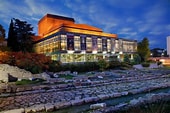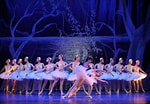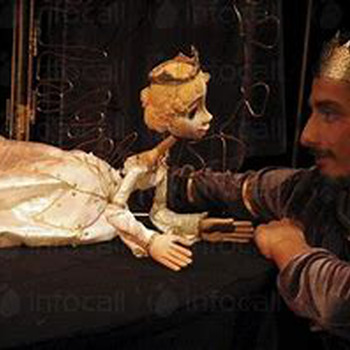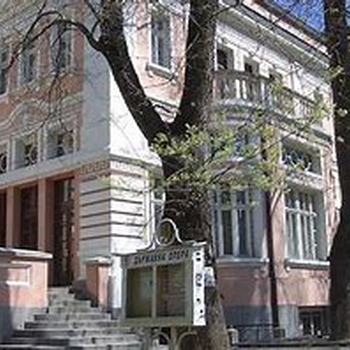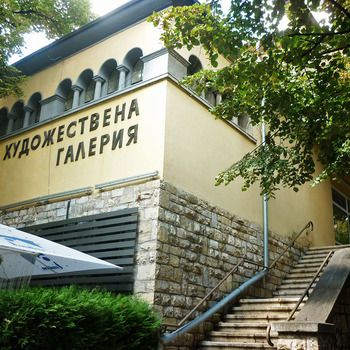State Opera
Overview
The Foundations of the Modern Music Culture in Stara Zagora were established in the middle of the 19th century. At the end of the century, the first permanently functioning church and secular choirs were also created. There began the organization of theatrical performances, often using musical accompaniment as well. In 1897, the Music Association “Kaval” was founded. The Military Wind Band, school choirs, orchestras and music-and-theater ensembles contributed to the fast modernization of the cultural life in the city.
On 1 July 1925 occurred the premiere of the opera “Gergana” by Maestro Atanasov.
Conductor was Atanas Kovachev, director – Mara Shopova, choirmaster – Zlatan Stanchev. In the leading roles: Gergana – Nichka Hadzhimiteva (Batalova), Nikola – Georgi Batalov, Hristina – Radka Profirova, Gradpa Nedyalko – Petrar Totev, Selim Bey – Tenyu Velev, Muhtar Aga – Stefan Georgiev, Gradma Tsona – Hristina Georgieva. The event was the basis for the beginning of the first out-of-the-capital permanently functioning opera in Bulgaria.
There followed “Il trovatore” by Giuseppe Verdi, conductor Hristo Manikov, director Mara Shopova, artist Toma Grigorov and choirmaster Stefan Daskalov (24 April 1927) and “Il barbiere di Siviglia” by Gioachino Rossini, conductor Hristo Manikov, director Dimitar Hristov, artist Vasil Daalov and choirmaster Zlatan Stanchev (4 December 1927).
Gradually the Stara Zagora Opera expanded its activity.
On 22 March 1928, there was created the Regional Opera – Stara Zagora and the region of performing in Burgas, Tarnovo and Plovdiv. A little later the opera “La traviata” by Verdi was staged with conductor Aleksandar Georgiev, director Dimitar Hristov, artist G. Karl and choirmaster Zlatan Stanchev (30 June 1928). In September 1931, it was named South-Bulgarian Regional Opera.
In 1933, the first director – Dimitar Hristov was appointed, and Aleksandar Georgiev got the appointment of conductor. On 14 May 1934, the troupe was renamed the Stara Zagora Municipal Opera. Guided by Dimitar Hristov the troupe re-created the existing productions and prepared the premiere of the opera “Les pecheurs de perles” by Georges Bizet.
In 1942, the Municipality granted the former building of Radio Stara Zagora for rehearsals to the Opera, opposite the City Garden (today a Department Store). At the same time, young conductor Romeo Raychev was appointed head of the administration of the Opera Theater. The aesthetic level of the troupe was sustained by directors Hristo Popov, Dragan Kardzhiev, Misho Hadzhimishev, Petar Raychev, Stefan Makedonski, Georgi Popov and others.
In 1946 the Theater was formed as a state cultural institute – People’s Opera – Stara Zagora
directly administrated and financed by the Ministry of Information and the Arts. The participations of the opera divas Elisaveta Yovovich and Katya Spiridonova also contributed to the turning of Stara Zagora into an attractive music center. In the new conditions, with the increase in its troupe and professionally prepared participants, the Stara Zagora Opera felt strong enough to turn to more large-scale operas of the world classic: “Prodana Nevesta” by B. Smetana, “Rusalka” by Al. Dargomyzhsky, “Carmen” by G. Bizet, “La boheme” by G. Puccini, “Prince Igor” by Al. Borodin, “Die Freischutz” by Weber, “Un ballo in maschera”, “Don Carlos” and “Simon Boccanegra” by G. Verdi. A ballet troupe was also created with its own repertoire. More and more often the Opera staged new works by Bulgarian composers as well.
In 1971 the new modern building of the Opera was constructed
The designers were Architect Mihail Sokolovsli, Architect Kamilarov and Architect Tsanko Hadzhistoykov. The improved technical capacities of the stage allowed the presentation of the whole wealth of the opera and ballet repertoire, including the guest-performing theaters from Bulgaria and abroad. Thus, naturally the December Music Days, founded in 1967, grew into the Festival of the Opera and Ballet Arts in 1974. Once in five years, within the framework of the Festival, is held the National Review of The Bulgarian Opera Troupes.
In the 70s and 80s of the 20th century, such operas as “Aida” by Verdi, “Der fliegende Hollander” by Wagner, “Boris Godunov” by Mussogsky, “La forza del destino” by Verdi were staged. The Stara Zagora Opera produced many works by contemporary authors as well – “A Midsummer Night’s Dream” by B. Britten, “Colas Breugnon” by D. Kabalevsky, the ballet “Abraxas” by Werner Egk and others. On the stage of the Opera in Stara Zagora 14 premieres with Bulgarian titles have been presented for the last years of the history of the Festival.
The contribution for the professional achievements of this period belongs to conductors Romeo Raychev, Simeon Fetvadzhiev, Dimitar Dimitrov, Veselin Nenov, Mihail Popov, Ivan Dimov, Bozhidar Bonev, Bogdana Popova, Anastas Anastasov, Krasimir Kashev, directors Georgi Petrov, Mihail Hadzhimishev, Stoyan Velev, Rumen Neykov, artists Petar Ruskov, Mariya Trendafilova, Ivan Yordanov, Venera Naslednikova, Mariya Dimanova, Boris Stoynov, Tsvetanka Stoynova, Dimo Kostadinov, choreographers Asen Manolov, Teodorina Stoycheva, Asen Gavrilov, Margarita Arnaudova, Nedelcho Izov, Snezhana Deskova.
In the period 1991 – 2010 the building of the Opera was devastated by fire and restored.
The spectacle activity was initially moved to the Trade Unions Home, the Home of the Transport Workers (1993 – 1997) and the restored building of the theater (1997 – 2009). Nineteen years after the fire, on 5 October 2010, on the Day of Stara Zagora, with the premiere of the opera “Carmen “ by Georges Bizet, the opera building opened its doors for the audiences again.
Today the Stara Zagora State Opera is a theater with a rich repertoire of opera, operetta, ballet, children’s spectacles and symphonic concerts. The theater has guest-performed on international stages in Europe and America as well.
For the last one hundred years the opera development in Stara Zagora has been invariably associated with the names of the opera singers, born in Stara Zagora, with worldwide careers: Christina Morfova, Dimitar Uzunov, Anna Tomowa-Sintow, Stefka Mineva and Vesselina Kasarova.
Recommended
- Ancient Forum of Augustus Trajan
- Hall of Laughter
- Zoo
- Bedechka Park
- Neolithic dwellings Museum
- Archaeological complex "Museum of Religions"


 Bulgarian
Bulgarian Romanian
Romanian